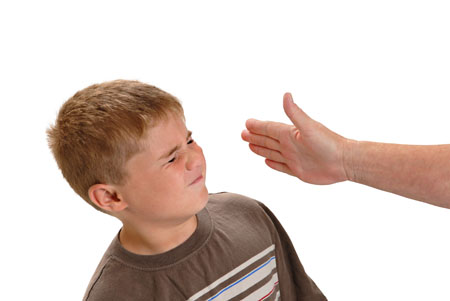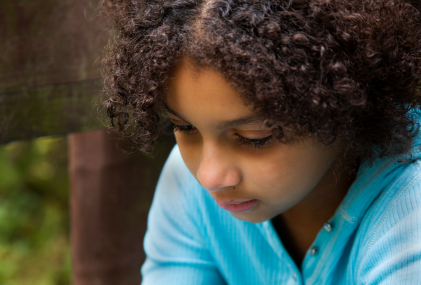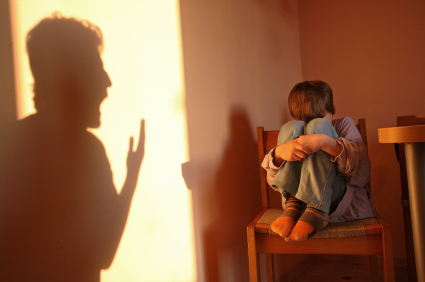American Academy of Pediatrics Recommends Parents Avoid Spanking and Verbal Abuse
The American Academy of Pediatrics (AAP) has issued a policy statement calling for an end to corporal punishment, including spanking. These forms of punishment are tied to negative outcomes in every developmental area.
Children spanked regularly at age 3 had increased aggression risk by age 5. They also had more negative behaviors and lower vocabulary scores at age 9. Abusive behavior raises stress hormones and is associated with mental health struggles.
Verbal abuse should also be avoided. Verbal abuse includes punishment that shames, humiliates, threatens, frightens, or ridicules a child. Use of time outs, removal of privileges, and other forms of quiet discipline are recommended alternatives.
Editor’s Note: In our research network, the Bipolar Collaborative Network, we found that verbal abuse by itself (without the physical or sexual abuse that often accompany it) is associated with an earlier age of onset of bipolar disorder and a more difficult course of illness.
Family focused therapy (FFT) and other forms of family therapy are highly recommended for children of a parent with bipolar illness. These children are at high risk for a variety of psychiatric diagnoses, and those already experiencing depression, cyclothymia (mood swings between high and low) or a diagnosis of bipolar disorder not otherwise specified (BP-NOS) are much improved with FFT compared to treatment as usual. FFT teaches family members to recognize symptoms of illness for what they are rather than interpreting them as deliberate hostility, increases family communication and problem solving, and leads to good long-term outcomes.
Verbal Abuse in Childhood, Like Physical and Sexual Abuse, Linked to Earlier Onset and More Difficult Course of Bipolar Disorder
Earlier research has shown that childhood adversity is linked to earlier age of onset of bipolar disorder and more difficult course of illness. Physical and sexual abuse are associated with both earlier age of onset and more difficulties such as anxiety disorders and substance abuse. Now, new research by this editor (Robert M. Post) and colleagues links verbal abuse (even in the absence of physical and sexual abuse) to earlier onset of bipolar disorder and to more severe and complicated course of illness.
The study, published in the journal Bipolar Disorders, was based on the self-reports of 634 adult outpatients with bipolar disorder at four sites in the US. These participants were interviewed about their history of illness and the frequency of adverse events they experienced in childhood, adolescence, and adulthood, including physical, sexual, and verbal abuse. Twenty-four percent of these participants reported having experienced verbal abuse occasionally or frequently in childhood, but not other forms of abuse, while another 35% had a history of verbal abuse as well as physical or sexual abuse, for a total of 59% with a history of verbal abuse.
The greater the frequency of verbal abuse in childhood, the earlier the average age of onset of bipolar disorder. Participants with no history of abuse had a mean age of onset of 20.6 years, but verbal abuse by itself reduced the mean age of onset to 16.5 years, and verbal abuse plus sexual abuse reduced the mean age of onset to 15.3 years. (The mean age of onset for participants who experienced sexual abuse alone was 17.5 years.) It was impossible to determine the combined effect of verbal and physical abuse because verbal abuse was almost always present when physical abuse occurred. For the 14% of the participants who had experienced verbal, physical, and sexual abuse in childhood, the mean age of onset of bipolar disorder was 13.1 years.
Those who were verbally (but not physically or sexually) abused in childhood had more anxiety disorders, drug abuse, and rapid cycling than those who were not abused, but not more alcohol abuse. Those who were verbally abused also showed increasing severity of illness, including increased frequency of cycling.
Genetics can also play a role. Having a parent with a mood disorder also contributed to an earlier age of onset of bipolar disorder.
Editor’s Note: Researcher David J. Miklowitz and colleagues have shown that family focused therapy (FFT), which emphasizes illness education and communication enhancement within the family, is more effective than treatment as usual for children with a family history of bipolar disorder and a diagnosis of depression, cyclothymia, or bipolar not otherwise specified (BP NOS).
FFT was particularly effective in reducing symptoms in children from families with high expressed emotion, suggesting that this kind of family-based intervention could reduce levels of verbal abuse.
Adversity May Increase Risk of Mood Disorders
In adults with bipolar disorder, adversity in childhood has been associated with an earlier onset of bipolar disorder compared to those who did not experience some form of adversity such as verbal abuse, physical abuse, sexual abuse, loss of a parent, abandonment, or neglect. At the 2013 meeting of the Society of Biological Psychiatry, Nancy Low et al. reported that the number of these stressful life events a child experienced was associated with the number of their anxiety symptoms, psychiatric disorders, and lifetime substance abuse. Having experienced 3 or more adversities was associated with a 3.5-fold increased risk for developing a mood disorder and a 3-fold increase in anxiety disorders and alcohol or drug abuse.
While the study has not yet been published in a peer-reviewed journal, the abstract (#194) may be found in the meeting supplement, Volume 73, Number 9S of the journal Biological Psychiatry.
Editor’s Note: Low’s study is the first to report that childhood adversity is a risk factor for the onset of bipolar disorder in the general population.
Given the increasing evidence for the persistence of epigenetic marks on DNA and histones (which can’t change the sequence of genes but can change their structure) in those who have experienced such stressors in childhood, this could provide a mechanism for the long-term vulnerability of these children to the development of mood disorders and a variety of physical illnesses.
U.S. Patients with Bipolar Disorder Have More Stressors in Childhood and Prior to Illness Onset
In research published since 2008, our Editor-in-Chief Robert M. Post and colleagues in the Bipolar Collaborative Network have compared patients with bipolar disorder in the United States to those in Germany and the Netherlands. Compared to the European sample, patients in the US have more genetic vulnerability to bipolar disorder (by having a parent with bipolar disorder), earlier onsets of their illness, more complicated courses of illness, greater treatment resistance, and more medical comorbidities. Patients in the US also have more psychosocial stress.
The researchers are now turning their attention to these psychosocial vulnerabilities, and in a new paper that will be published in Psychiatry Research (late in 2013 or early in 2014), the authors show that patients in the US had more stressors both in childhood and just prior to the onset of their illness. Childhood stressors analyzed in the study were verbal abuse, physical abuse, and sexual abuse. Stressors in adulthood included indicators of a lack of social support, troubles with finances or employment, lack of access to health care, and medical comorbidities.
The stressors patients experienced just prior to their most recent episode of bipolar illness were related to: stressors in childhood, an earlier age of illness onset, anxiety and substance abuse comorbidity, lower income, both parents having an affective illness such as depression, and feeling more stigma.
The new research suggests that for patients with bipolar disorder in the US, adverse life events in childhood and later in life are more prevalent than they are for patients in the Netherlands or Germany. Earlier and more effective approaches to these stressors, such as the Family-Focused Therapy developed by David Miklowitz and Kiki Chang, could potentially slow the onset or progression of bipolar illness in this country.





